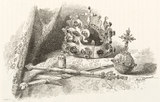-

Hugo Charlemont: The Coronation Insignia of Bohemia, illustration
Copyright: Schloß Schönbrunn Kultur-und Betriebsges.m.b.H./Fotograf: Alexander E. Koller
Partner: Schloß Schönbrunn Kultur- und Betriebsges.m.b.H. -

Bohemian towns I, photograph, around 1898
Copyright: Schloß Schönbrunn Kultur-und Betriebsges.m.b.H./Fotograf: Alexander E. Koller
Partner: Schloß Schönbrunn Kultur- und Betriebsges.m.b.H. -

Bohemian towns II, photograph, around 1898
Copyright: Schloß Schönbrunn Kultur-und Betriebsges.m.b.H./Fotograf: Alexander E. Koller
Partner: Schloß Schönbrunn Kultur- und Betriebsges.m.b.H.
Coming next after the suppression of the 1848 Revolution was at first a political ice age. Nevertheless, the people’s demands could not be permanently ignored. National-liberal ideas had cast strong roots also in the Czech bourgeoisie, just emerging at the time.
Because of the weakness of his neo-absolutist regime in both foreign and internal affairs Emperor Franz Joseph was forced to comply with people’s demands to have a say in political affairs. One of the main demands of the bourgeoisie was met when in accord with the resolutions of the February Patent of 1861 the Imperial Diet was called together, which was to include members from the respective provincial diets. But the Czech representatives of the Bohemian lands felt disadvantaged, because the member’s election to the provincial diet was based on the census franchise; this paired political vocal rights with tax contributions and thus gave the Germans – the economic élite in the country – a disproportionately stronger representation in the Bohemian Diet than corresponded to their actual number.
The feeling of being disadvantaged also determined the Czechs’ participation in the overall development of the commonwealth. The political representatives of the young Czech nation sent their members to the Imperial Council in Vienna, which now had powers of constitution, but they had their reservations, since they felt it to be an instrument of German-dominated centralism.
In the spirit of Austro-Slavism, the Czechs favoured a federalist policy towards nationalities. Discussion of their placement within the Monarchy was conducted with the motto of the Bohemian Constitutional Law. This implied the special constitutional position of the historical Bohemian lands (Bohemia, Moravia, Silesia), which since the Middle Ages had formed a unit with autonomous legal tradition and administration. However, this had been suspended in the course of centralist reforms under Maria Theresa. Ever since, the Bohemian lands had been lumped together in administration as individual provinces together with the Austrian Hereditary Lands. The Bohemian Constitutional Law had now become the doctrine of Czech politics, which aimed to fight for the autonomous status of the lands within the framework of the Monarchy.
However, these demands were disappointed: the most important change brought about by constitutionalism, namely, the complete reorganisation of the Monarchy through the Austro-Hungarian Compensation of 1867, was a slap in the face for the Czech national movement – the Czechs, who had submitted similar autonomist demands as the Hungarians, saw themselves disadvantaged once again. The consequence was a radical change in the attitude of the leading representatives of the Czechs to the Austrian Empire, which was now increasingly seen as an obstacle to their national evolution.
Translation: Abigail Prohaska
Hoensch, Jörg K.: Geschichte Böhmens. Von der slavischen Landnahme bis ins 20. Jahrhundert, München 1987
Kořalka, Jiří/Crampton, Richard J.: Die Tschechen, in: Wandruszka, Adam/Urbanitsch, Peter (Hrsg.): Die Habsburgermonarchie 1848–1918, Band III: Die Völker des Reiches, Wien 1980, Teilband 1, 489–521
Kořalka, Jiří: Tschechen im Habsburgerreich und in Europa 1815 bis 1914. Sozialgeschichtliche Zusammenhänge der neuzeitlichen Nationsbildung und der Nationalitätenfrage in den böhmischen Ländern (Schriftenreihe des Österreichischen Ost- und Südosteuropa-Instituts 18), Wien 1991
Křen, Jan: Dvě století střední Evropy [Zwei Jahrhunderte Mitteleuropas], Praha 2005
Rumpler, Helmut: Eine Chance für Mitteleuropa. Bürgerliche Emanzipation und Staatsverfall in der Habsburgermonarchie [Österreichische Geschichte 1804–1914, hrsg. von Herwig Wolfram], Wien 2005
Stourzh, Gerald: Die Gleichberechtigung der Nationalitäten in der Verfassung und Verwaltung Österreichs 1848 bis 1918, Wien 1985
-
Chapters
- The Czechs in the Habsburg Monarchy
- How Czechs evolved from Bohemians
- The Revivalists of the Nation
- Separate Ways: The Effects of the 1848 Revolution in Bohemia
- The Vectors of Czech National Identity
- The Call for Autonomy
- Hardening of the Fronts: The Czech Demand for the Bohemian Compromise
- Attempts at Solutions and Escalation: Language Conflict and Badeni Crisis
- The Czechs’ Spectrum of Parties
- The Lack of Alternatives: the Attitude of the Czechs towards the Habsburg Monarchy at the Outbreak of the War




